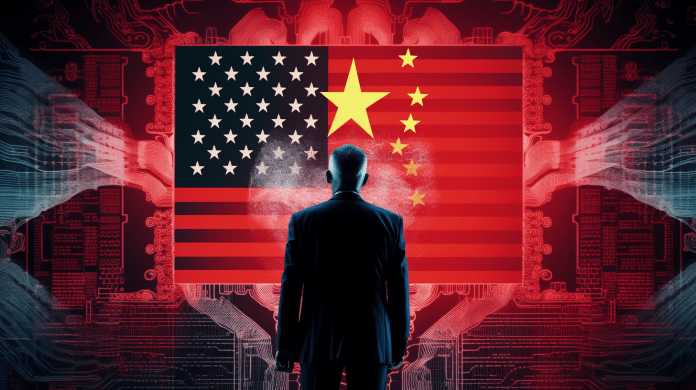Photo was created by Webthat using MidJourney
Introduction and US Ban on Investment
In a move that has escalated tensions between the United States and China, the US government has decided to prohibit American investments in specific segments of China’s high-tech sector. These restrictions notably encompass artificial intelligence, further straining the already delicate relationship between the two global superpowers. This development comes as part of the US government’s effort to scrutinize foreign business activities conducted by private companies, particularly in the realm of advanced technology.
Disclosure and Strained Relations
American companies will also be required to disclose their investments made in China’s high-tech sectors. The decision to implement these restrictions is expected to not only impact the economic dynamics between the two nations but also introduce new layers of complexity in their relationship. While the US government insists that these measures will be narrowly targeted, their implications are poised to reverberate throughout the world’s two largest economies.
China’s Response and Disappointment
China has expressed its disappointment with the US decision, stating that the US has continually escalated suppression and constraints on China. A spokesperson for the Chinese embassy in Washington, Liu Pengyu, emphasized the disparity between the White House’s claims of not intending to harm China’s economy or sever bilateral ties and the actual actions being taken. China urged the US to uphold its commitments.
Scope and Implications of the Order
President Biden’s order marks the formal commencement of efforts to establish regulations that prohibit American businesses from investing in companies from countries deemed as “concerns,” specifically those engaged in quantum computing, advanced semiconductors, and select areas of artificial intelligence.
Furthermore, US companies will be obligated to report investments in enterprises working on a broader spectrum of artificial intelligence and semiconductor technology. While portfolio investments via the stock market are not expected to be affected, the focus is on active investments managed by private equity, venture capital, and similar firms. The impending rules will undergo a public comment period, offering further clarity on the types of investments subject to restrictions. Their actual implementation is anticipated to take several months.
National Security and Economic Ramifications
Senior administration officials have emphasized that this move is primarily a national security action rather than an economic one. Despite this clarification, the development represents an unprecedented expansion of government oversight, as noted by Sarah Bauerle Danzman, a senior fellow at the Atlantic Council. Outbound investment controls are uncommon among advanced economies, with Japan and Korea being the only countries to have similar measures.
Historically, US-China trade constraints have revolved around curbing sensitive technology sales and vetting Chinese investments in American enterprises, with prior administrations also blocking investments in companies linked to China’s military.
Global Response and Future Prospects
The US has garnered substantial support in Washington for this measure, as it addresses a regulatory gap concerning financial transactions that could inadvertently contribute to China’s military aspirations. The US is actively seeking international backing for these investment restrictions, and there have been indications of alignment, such as the UK considering similar measures and the European Commission proposing investment limitations in sensitive technologies.
The extent of the order’s impact on investment flows remains uncertain, especially considering China’s status as the second-largest destination for foreign investment in 2022. While these actions signal a growing divergence in economic relations, their long-term effects on technological innovation and global cooperation remain subjects of debate.


